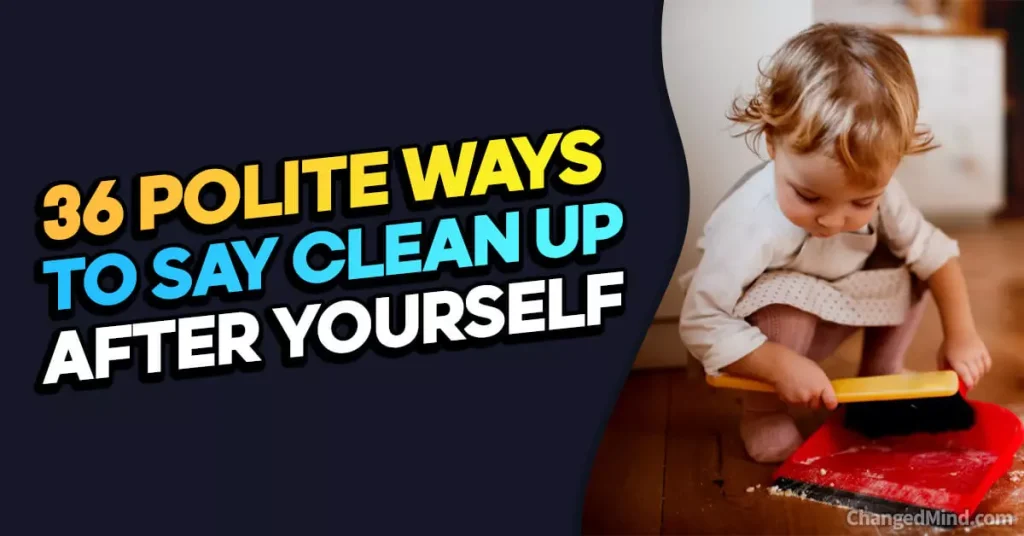Does asking others to tidy up make you feel like a nagging parent? Worry not! With our 36 polite ways to say clean up after yourself, maintaining a clutter-free environment has never been easier, or more diplomatic.
We’re here to help you communicate effectively, foster tidiness, and avoid uncomfortable confrontations. Ready to clean up the communication mess? Let’s dive right in!
Key Points to Discuss:
- Understanding the importance of politeness in requests
- 36 diplomatic ways to ask for cleanliness
- When and how to use these polite phrases
- Maintaining good relationships while fostering tidiness
Cleanliness and respect are essential aspects of maintaining a harmonious and hygienic environment, whether it’s at home, in the workplace, or in shared spaces. When it comes to addressing the importance of cleaning up after oneself, using polite language is crucial for effective communication and fostering positive relationships. By adopting a considerate and respectful approach, it becomes easier to encourage cleanliness without causing offense or conflict.

There are various polite ways to encourage cleanliness and convey the message effectively. These include requesting help, appreciating efforts, suggesting collaborative efforts, setting a good example, and even using humor to lighten the mood. By utilizing these strategies, you can create an environment where the importance of tidiness is understood and integrated into the daily routines of individuals.
To ensure polite communication, it is essential to use appropriate phrases that convey the message clearly and respectfully. Some common phrases that can be used include:
- “Would you mind tidying up after yourself?”
- “I would appreciate it if you could clean up after yourself.”
- “Let’s all pitch in and keep our space clean.”
- “It would be great if we could all take responsibility for our mess.”
- “Keeping things clean is important. Let’s do our part.”
Finally, when engaging in conversations about cleanliness, it is important to follow proper etiquette. Being polite and respectful, using a kind and friendly tone, choosing the right time and place for the conversation, offering assistance if needed, and expressing gratitude for efforts made can go a long way in promoting a culture of cleanliness and respect.
By incorporating these strategies and tips, you can effectively communicate the importance of cleanliness while maintaining respectful and positive relationships with those around you.
The Importance of Cleanliness and Respect

The importance of cleanliness and respect cannot be overstated. By prioritizing these qualities, individuals can create a positive atmosphere that promotes well-being and professionalism.
Regularly cleaning personal and communal spaces helps prevent the spread of germs and ensures a healthy environment for everyone. By practicing good hygiene habits, such as washing hands frequently and properly, individuals can reduce the risk of illnesses and promote overall well-being.
Keeping common areas tidy and organized promotes efficiency and productivity, as it allows for easy access to necessary items and materials. Adhering to cleanliness standards also demonstrates a sense of professionalism and respect for oneself and others in shared spaces.
Creating a cleaning schedule or assigning responsibilities to maintain cleanliness can distribute the workload and ensure everyone contributes to a clean and healthy environment.
Fostering respect is equally important. Respecting one another’s personal space and belongings is crucial for maintaining a harmonious atmosphere. Effective communication and active listening are key components of respect, as they foster understanding and collaboration among individuals.
Showcasing empathy and treating others with kindness cultivates a positive and inclusive environment. Respecting diverse perspectives and cultures fosters a sense of inclusivity and promotes harmony within a community.
Being punctual for meetings and appointments demonstrates respect for others’ time and helps create a productive and efficient work environment. It is important to recognize that cleanliness and respect go hand in hand. By keeping our surroundings clean, we show respect for ourselves and for others.
Conversely, by respecting the people around us, we cultivate an environment that encourages cleanliness and hygiene. Remember, the importance of cleanliness and respect are the foundation of a healthy and harmonious environment, leading to improved well-being and enhanced proficiency in both personal and professional settings.
Why Use Polite Language to Communicate?
Polite communication is essential in our daily interactions, whether it be at home, work, or in public settings. Using polite language not only demonstrates respect and consideration for others, but it also helps to foster positive relationships and effective communication.
1. Promotes positive social interactions: Polite language creates a harmonious and respectful environment, enhancing social interactions with others. It helps to build rapport, establish trust, and foster a sense of inclusivity. By using polite language, we show our kindness and consideration towards others, which can lead to more positive and meaningful connections. Additionally, incorporating polite language into our communication promotes positive social interactions, benefiting both ourselves and those around us.
2. Enhances understanding and receptiveness: Polite language allows for better reception of our message. When we communicate in a polite and respectful manner, it encourages others to listen and respond more positively. It promotes open and effective communication, increasing the likelihood of our message being understood and accepted. Therefore, using polite language is crucial in ensuring that our intended message is received and comprehended accurately.
3. Cultivates a constructive atmosphere: Polite language helps in maintaining a constructive atmosphere, especially during challenging or conflicting situations. It allows for expressing differing viewpoints without causing offense or escalating tensions. Politeness encourages cooperation, compromise, and finding common ground to resolve conflicts amicably. By incorporating polite language into our communication, we create an environment where people feel comfortable expressing their opinions and working towards mutually beneficial solutions.
4. Boosts professionalism and credibility: Polite language is key to maintaining professionalism and credibility in various contexts. Whether it is in a professional setting, such as a workplace or business negotiation, or even in personal relationships, politeness reflects our professionalism and integrity. It shows that we value and respect others’ opinions, increasing the likelihood of successful outcomes. Utilizing polite language is essential for building and maintaining a positive reputation and establishing ourselves as trustworthy individuals.
5. Supports cultural sensitivity and inclusivity: Polite language has a significant role in promoting cultural sensitivity and inclusivity. By being mindful of how we communicate, we can avoid unintentional offense or misunderstanding of different cultural backgrounds and norms. Politeness helps bridge cultural gaps, cultivates tolerance, and creates an inclusive environment for diverse perspectives. Respectful and polite communication allows individuals from different cultures to feel valued and included, fostering a sense of belonging and appreciation for their unique perspectives.
Polite Ways to Encourage Cleanliness
Looking to encourage cleanliness without sounding rude or demanding? In this section, we’ll explore various polite ways to inspire others to clean up after themselves.
From requesting help to appreciating efforts, suggesting collaborative efforts, setting a good example, and even using humor, we’ve got you covered.
Discover effective strategies to promote cleanliness in a friendly and respectful manner.
No more confrontations or awkward conversations – let’s cultivate a cleaner environment together!
Requesting Help
When requesting help in a polite manner, it is important to use clear and respectful language. By doing so, you can effectively communicate your needs without sounding demanding or rude. Here are some polite ways to request help:
- “Could you please lend me a hand?”
- “Would you mind assisting me with this task?”
- “I would greatly appreciate your help with…”
- “If you have a moment, could you please help me with…”
- “I could use some assistance. Would you be able to help me?”
When making these requests, it is essential to use a friendly tone and to be considerate of the other person’s time and availability. Avoid being forceful or assuming that the person will automatically agree to help. Instead, ask for their assistance with kindness and flexibility.
Additionally, when requesting help, it is important to offer gratitude and show appreciation for the individual’s assistance. This helps to maintain a positive and respectful relationship. Thank the person for their time and effort, and express your gratitude for their willingness to help.
Remember, effective communication is crucial in polite requests for help. By using proper manners and expressing your needs respectfully, you increase the likelihood of receiving assistance and fostering positive relationships with others. So, next time you need help, make sure to ask politely and show appreciation for the support you receive.
Appreciating Efforts
Appreciating efforts is an important aspect of promoting cleanliness and respect. By acknowledging and recognizing the efforts made by others to keep the space clean, we encourage a positive environment and motivate others to continue their good work.
- Recognize the hard work: It is essential to acknowledge and appreciate the efforts made by individuals in maintaining cleanliness. Expressing gratitude for their contributions boosts their morale and encourages them to continue their efforts in the future.
- Show gratitude: A simple “thank you” goes a long way in appreciating the efforts put in by someone. It demonstrates that their actions are valued and recognized.
- Highlight the positive impact: When appreciating efforts, emphasize the positive impact it has on the overall environment. For example, you can mention how their cleanliness efforts have created a more pleasant and welcoming space for everyone.
- Encourage others: Use appreciative language to inspire others to join in and contribute to the cleanliness efforts. By praising someone’s actions, you can inspire others to follow suit and maintain the cleanliness of the space collectively.
- Lead by example: When appreciating efforts, it is essential to set a good example yourself. Show that you also value cleanliness and always make an effort to keep the space clean. This can inspire others to take responsibility and maintain cleanliness as well.
By appreciating efforts, we create a positive and encouraging atmosphere that fosters cleanliness and respect. It motivates individuals to continue their efforts and compels others to join in, ultimately leading to a cleaner and more harmonious environment.
Suggesting Collaborative Effort
When it comes to encouraging cleanliness in a collaborative way, there are several steps you can take:
- Suggesting a collaborative effort: Begin by initiating a respectful and polite conversation with the individuals involved. Address the need for cleanliness and emphasize the importance of working together.
- Highlight the benefits: Explain the advantages of maintaining a clean space, such as improved hygiene, a pleasant environment, and increased productivity. Emphasize that everyone will benefit from a collaborative effort.
- Identify responsibilities: Clearly define each person’s role and responsibilities in keeping the space clean. Assign tasks and ensure that everyone understands their obligations towards cleanliness.
- Create a cleaning schedule: Develop a schedule that specifies when and how different cleaning tasks will be carried out. This ensures that responsibilities are evenly distributed and everyone knows what needs to be done.
- Promote accountability: Encourage open communication and accountability among the individuals involved. Stress the importance of taking responsibility for one’s actions and the impact they have on the overall cleanliness of the space.
- Provide resources: Ensure that individuals have access to the necessary cleaning supplies, such as cleaning solutions, brooms, and trash bins. This enables them to fulfill their cleaning responsibilities effectively.
- Offer incentives: Consider implementing a reward system to motivate individuals to maintain cleanliness. This could involve acknowledging and appreciating their efforts, or providing small incentives as a token of gratitude.
- Regularly assess progress: Conduct regular check-ins to evaluate the progress and effectiveness of the collaborative effort. Address any challenges or concerns that arise and make adjustments to the cleaning plan as needed.
By suggesting a collaborative effort and implementing these steps, you can create a culture of cleanliness and mutual respect in the shared space.
Cleanliness may be next to godliness, but setting a good example is the quickest way to get everyone in line.
Setting a Good Example
Setting a good example is crucial when it comes to encouraging cleanliness and respect in our surroundings. By demonstrating proper behavior and cleanliness ourselves, we can inspire others to follow suit.
Here are some ways in which you can set a good example:
1. Keep your personal space clean and organized. Maintain a tidy workspace, bedroom, or living area, ensuring that everything is in its designated place.
2. Dispose of trash properly. Use designated trash bins and recycling containers, and encourage others to do the same. This helps maintain cleanliness and promotes environmental responsibility.
3. Clean up after yourself in shared spaces. Whether it’s the kitchen, bathroom, or common areas, make sure to clean up any mess you create, such as spills, leftover food, or personal belongings.
4. Practice personal hygiene. Set an example by maintaining good personal hygiene habits such as washing your hands regularly, covering your mouth when coughing or sneezing, and properly disposing of tissues.
5. Follow rules and guidelines. Whether it’s at home, school, or in public spaces, adhere to rules and regulations concerning cleanliness and respect. This shows others that you value the importance of maintaining order and cleanliness in shared spaces.
By setting a good example, you not only contribute to a cleaner and more respectful environment but also influence those around you positively. Remember, actions speak louder than words, and leading by example can inspire others to adopt similar habits.
Pro-tip: If you notice someone struggling with cleanliness or respect, instead of criticizing or reprimanding them, offer guidance and support. Encourage them to make small changes and acknowledge their efforts. Leading with kindness and understanding can make a significant impact on their behavior.
Laughter is the best detergent, so why not sprinkle some humor to encourage cleanliness?
Using Humor
Using humor can be an effective way to encourage cleanliness and respectful behavior. It lightens the mood and makes the message more memorable. By adding a touch of humor to your communication, you can make the conversation more enjoyable and increase the likelihood that people will listen and respond positively.
Here are some ways to use humor when encouraging cleanliness:
1. Create funny signs: Instead of using generic signs that say “Clean up after yourself,” try creating humorous signs that catch people’s attention. For example, you could use a sign that says, “Did you drop that? Oh no, it must be your invisible friend’s mess!“
2. Tell funny stories: Share funny anecdotes or stories related to cleanliness. For example, you could talk about a time when you accidentally spilled something and made a big mess, and how you learned the importance of cleaning up promptly. This can help people relate to the situation and understand the importance of cleanliness in a lighthearted way.
3. Use playful reminders: Instead of constantly nagging or scolding, try using playful reminders to encourage cleanliness. For example, you could say, “Let’s keep this place so clean that even Marie Kondo would be proud!“
4. Sing a cleaning-themed song: Create a catchy jingle or adapt a popular song with lyrics that promote cleanliness. Singing or humming the song while cleaning can make the task more enjoyable for everyone.
5. Incorporate funny quotes: Find humorous quotes or sayings related to cleanliness and use them in your communication. For example, you could say, “Remember, a messy room is just an opportunity for a future episode of ‘Hoarders’!“
By using humor, you can make the message of cleanliness and respect more engaging and memorable. It helps create a positive atmosphere and encourages everyone to take responsibility for their actions in a lighthearted way.
True story: There was once a messy office with a constant problem of people leaving their dirty dishes in the sink. No matter how many reminders were given, the sink would always be full of dirty dishes. One day, someone came up with a creative idea. They placed a sign above the sink that said, “Help! The dishes in this sink have started their own civilization. Please clean up to avoid a dish rebellion!” Everyone in the office found the sign amusing, and it became a talking point. Gradually, people started taking responsibility for their dishes, and the sink remained clean. The use of humor made cleaning up after oneself a fun and memorable experience for everyone involved.
Let’s put the ‘clean‘ in ‘communication‘ with these polite phrases.
Common Phrases for Polite Communication
When it comes to polite communication, incorporating common phrases for polite communication can make all the difference in maintaining positive relationships and avoiding misunderstandings. Here are some common phrases for polite communication:
- Thank you: Expressing gratitude is a simple yet powerful way to show appreciation and maintain good manners. Saying “thank you” shows respect and acknowledges the other person’s contribution.
- Excuse me: This phrase is used to politely get someone’s attention or to apologize for interrupting. It is a polite way to ask for assistance or to navigate through a crowded space.
- Please: Adding “please” to a request demonstrates politeness and respect. It shows that you are not demanding or entitled, but rather asking for something in a considerate manner.
- I’m sorry: When you make a mistake or unintentionally hurt someone’s feelings, apologizing sincerely can help repair the relationship. Saying “I’m sorry” shows empathy and a willingness to make amends.
- Could you: Using this phrase instead of “can you” or “will you” when making a request adds politeness and consideration. It recognizes the person’s agency and allows them to decide whether or not they can fulfill your request.
- Is it possible: When asking for a favor or accommodation, using this phrase acknowledges that the other person may have their own limitations or constraints. It shows understanding and flexibility in your request.
- May I: Asking for permission politely and respectfully is important for maintaining harmonious relationships. Using “may I” instead of “can I” shows that you respect the other person’s authority or ownership over a particular situation.
- Could you please repeat: If you didn’t hear or understand something, asking for clarification using this phrase is a polite way to ensure effective communication. It shows that you value what the other person is saying and want to make sure you understand correctly.
- Have a nice day: Ending a conversation or interaction with this phrase is a friendly way to wish someone well. It adds a positive note and leaves a good impression.
Remember, using these common phrases for polite communication can greatly enhance your interactions and cultivate positive relationships. Keep in mind that the specific phrases you use may vary depending on the situation and cultural context.
Fact: Research has shown that using polite communication can lead to better outcomes in both personal and professional relationships. It enhances understanding, reduces conflict, and fosters cooperation.
“Would you mind tidying up after yourself?”
When it comes to asking someone to tidy up after themselves, it’s important to approach the situation politely and respectfully. Here are some steps to follow:
- Choose the right time and place: Find a suitable moment when the person you want to talk to is not too busy or preoccupied. It’s important to have their full attention.
- Be polite and respectful: Start the conversation by expressing your appreciation for their presence and acknowledging their efforts in other areas.
- Use a kind and friendly tone: Speak in a calm and gentle manner, ensuring that your tone conveys your respect and understanding.
- Clearly state your request: Would you mind tidying up after yourself? Phrase your request using polite language, such as “Would you mind tidying up after yourself?” This request is direct and respectful, making it clear what you are asking for.
- Offer assistance if needed: If the person seems overwhelmed or unsure of what to do, offer your help or guidance. Let them know that you are there to support them.
- Follow up with gratitude: After the person has tidied up, make sure to express your appreciation. Thank them for their cooperation and efforts in maintaining cleanliness.
By following these steps, you can ask someone to tidy up after themselves in a polite and respectful manner, fostering a harmonious and clean environment.
Remember, good communication and respectful interactions are key to maintaining cleanliness and creating a positive atmosphere for everyone. If cleanliness is next to godliness, then I must have a VIP pass to the devil’s den.
“I would appreciate it if you could clean up after yourself.”
When it comes to maintaining a clean and respectful environment, it is important to communicate your expectations politely and effectively. One way to encourage cleanliness is by using the phrase “I would appreciate it if you could clean up after yourself.” Here are some reasons why this approach is beneficial:
- Respectful tone: By using the phrase “I would appreciate it,” you are conveying your request in a polite and respectful manner. This helps to maintain a positive and cooperative atmosphere.
- Clear expectations: The phrase clearly communicates what you expect from others, which is to clean up after themselves. This eliminates any confusion or misunderstandings about your expectations.
- Empowering others: By expressing your request politely, you are empowering others to take responsibility for their actions. It encourages them to demonstrate their consideration for others and contribute to a clean and organized space.
- Mutual cooperation: Using polite language fosters a sense of collaboration and teamwork. When everyone understands and respects each other’s expectations, it becomes easier to work towards a common goal of cleanliness and organization.
- Positive reinforcement: Acknowledging and appreciating others’ efforts to clean up after themselves reinforces their behavior. It encourages them to continue practicing good habits and motivates others to follow suit.
True story: I once lived in a shared apartment with three other roommates. We all had different schedules and responsibilities, which sometimes made it challenging to maintain cleanliness in our common areas. One day, I decided to have a conversation with my roommates and used the phrase “I would appreciate it if you could clean up after yourself.” I explained how a clean environment would benefit us all and how it would create a more harmonious living space.
I was met with understanding and agreement from my roommates. From that day forward, we all made conscious efforts to clean up after ourselves and even took turns doing a deep cleaning of the shared spaces every week. Our apartment transformed into a clean and inviting space, and our positive communication played a significant role in achieving that.
Cleaning up after ourselves is not just a suggestion, it’s the key to avoiding a horror movie-like mess.
“Let’s all pitch in and keep our space clean.”
When it comes to maintaining cleanliness and orderliness in our shared space, it’s essential that we all pitch in and contribute. By working together, we can create a clean and pleasant environment for everyone. Here are some ways we can actively participate in keeping our space clean:
- Being responsible for our own mess: Each of us should take responsibility for cleaning up after ourselves. This includes disposing of trash properly, tidying up our workstations, and cleaning any spills or messes we create.
- Offering assistance: If you notice someone struggling to clean up or having difficulty managing their tasks, offering a helping hand can make a significant difference. By assisting others, we can promote a culture of cooperation and support.
- Suggesting collaborative effort: Encouraging teamwork can be an effective way to keep our space clean. Instead of assigning blame or pointing fingers, we can suggest working together to tackle larger cleaning tasks like organizing shared areas or deep cleaning.
- Setting a good example: Leading by example is a powerful way to influence others. By consistently maintaining cleanliness and orderliness in our own spaces, we inspire those around us to follow suit.
- Using humor: Lightening the mood can make cleaning more enjoyable and engaging. Incorporating humor into our conversations and interactions regarding cleanliness can help foster a positive atmosphere and encourage participation.
In order to effectively communicate the importance of cleaning up after ourselves, consider using polite phrases such as:
- “Would you mind tidying up after yourself?“
- “I would appreciate it if you could clean up after yourself.”
- “Let’s all pitch in and keep our space clean.”
- “It would be great if we could all take responsibility for our mess.”
- “Keeping things clean is important. Let’s do our part.”
Remember, effective communication is key when discussing cleanliness. Here are some etiquette tips to keep in mind:
- Be polite and respectful in your words and actions.
- Use a kind and friendly tone to encourage cooperation.
- Choose the right time and place for conversations about cleanliness to ensure receptiveness.
- Offer assistance if needed to create a supportive environment.
- Follow up with gratitude and appreciation for everyone’s efforts.
By following these guidelines and encouraging everyone to contribute, we can promote a clean and harmonious space that benefits everyone.
“It would be great if we could all take responsibility for our mess.”
It is crucial for everyone to take responsibility for keeping our shared spaces clean. When each individual plays their part, it creates a more pleasant and hygienic environment for everyone involved. Here are some reasons why it would be great if we could all take responsibility for our mess:
- Improved cleanliness: By taking responsibility for our mess, we can ensure that our surroundings are clean and tidy. This not only enhances the aesthetics of the space but also promotes good health and hygiene. A clean environment reduces the risk of illness and the spread of germs.
- Sense of ownership: When we take responsibility for our mess, we develop a sense of ownership and pride in our surroundings. It fosters a positive community spirit where everyone feels invested in maintaining the cleanliness of the space. This can lead to a more harmonious and cooperative environment.
- Efficiency: When everyone takes responsibility for their mess, it reduces the burden on others to clean up after them. This promotes a more efficient and effective cleaning process. It saves time and energy which can be utilized for other productive tasks.
- Respect for others: Taking responsibility for our mess demonstrates respect for others who share the space. It shows that we care about their well-being and are considerate of their needs. It fosters a culture of mutual respect and consideration among individuals.
- Positive example: When we take responsibility for our mess, we set a positive example for others to follow. It encourages a ripple effect where more people become conscious of their actions and take steps to keep the space clean. By leading through example, we can inspire positive change in our community.
It would be great if we could all take responsibility for our mess.
“Keeping things clean is important. Let’s do our part.”
Keeping things clean is important. Let’s do our part. In order to maintain a clean environment, it is important for everyone to take responsibility and do their part. Keeping things clean not only promotes hygiene but also creates a pleasant and comfortable space for everyone. Here are some ways we can contribute to the cleanliness:
- Respecting shared spaces: It is essential to respect the spaces we share with others. This means cleaning up after ourselves and not leaving a mess for others to clean up.
- Being proactive: Instead of waiting for someone else to clean up, take the initiative to clean up after yourself. This shows respect for others and helps maintain a clean environment.
- Regular maintenance: Regularly cleaning and tidying up the space can prevent dirt and clutter from accumulating. This includes wiping surfaces, vacuuming or sweeping floors, and organizing belongings.
- Proper waste disposal: Dispose of garbage and recyclables in the appropriate bins. This helps prevent litter and promotes recycling and waste reduction.
- Collaborative effort: Encourage others to join in the effort to keep things clean. When everyone works together, the task becomes easier and more effective.
By following these practices, we can all contribute to a clean and enjoyable environment. Let’s do our part and take responsibility for keeping things clean.
Etiquette Tips for Effective Communication
Effective communication is not just about the words we choose, but also the manner in which we convey our message. In this section, we’ll explore some etiquette tips that can make your conversations more impactful and respectful.
From using a kind and friendly tone to choosing the right time and place for discussions, we’ll provide practical advice to help you navigate sensitive conversations with finesse.
Additionally, we’ll highlight the importance of offering assistance when needed, fostering a culture of support and understanding.
Be polite and respectful
Being polite and respectful is essential when communicating with others. It sets the tone for positive interactions and promotes a harmonious atmosphere. Here are some key points to keep in mind:
- Use courteous language: The words we use can have a significant impact on how our message is received. It is important to choose words that are polite, considerate, and respectful. This helps to create a positive and respectful tone in any conversation.
- Listen actively: When someone is speaking, give them your full attention. Avoid interrupting or talking over them. Show that you value their input by nodding, maintaining eye contact, and responding appropriately. Actively listening demonstrates respect for the speaker and their ideas.
- Show empathy: Put yourself in the other person’s shoes and try to understand their perspective. Show empathy by acknowledging their feelings and validating their experiences. This fosters a respectful and supportive environment for open communication.
- Be mindful of body language: Nonverbal cues are just as important as verbal communication. Maintain an open posture, make eye contact, and use appropriate facial expressions to show interest and engagement. Avoid crossing your arms or displaying defensive body language, as it can create a barrier between you and the other person.
- Respect personal boundaries: Everyone has their own personal space and comfort levels. Be aware of these boundaries and respect them. Avoid invading someone’s personal space or touching them without their consent. Always ask before sharing personal information or giving advice.
By being polite and respectful, we can foster positive and meaningful connections with others. It lays the foundation for effective communication and promotes a welcoming and inclusive environment.
In 1863, Abraham Lincoln delivered the Gettysburg Address, a speech that exemplified the principles of politeness and respect. With only 272 words, Lincoln memorialized the soldiers who fought and died in the Civil War, emphasizing the importance of equality and unity. His words continue to serve as a reminder of the power of respectful communication in bringing people together.
Speak with the warmth and gentleness of a golden retriever, not the ferocity of a hungry velociraptor.
Use a kind and friendly tone
When communicating, it is crucial to incorporate a kind and friendly tone in order to maintain positive and respectful relationships. Whether you are addressing someone about cleaning up after themselves or any other topic, approaching the conversation with kindness and friendliness is important.
Here are some reasons why using a kind and friendly tone is effective:
- Builds rapport and trust: Speaking in a friendly manner helps to create a comfortable and welcoming environment. When people feel valued and respected, they are more likely to listen and respond positively to your requests.
- Fosters cooperation: By using a kind tone, you encourage a cooperative atmosphere where individuals are more inclined to work together towards a common goal. This promotes a sense of unity and teamwork.
- Reduces defensiveness: If someone feels attacked or criticized, they may become defensive and unwilling to comply with your request. However, approaching them with kindness and friendliness makes them more likely to be receptive and open to your suggestions.
- Promotes effective communication: Speaking in a friendly tone enhances understanding and clarity in a conversation. It helps establish a positive connection, making it easier for both parties to effectively communicate their thoughts and feelings.
- Maintains relationships: Using a kind and friendly tone shows respect and consideration for the other person. It helps preserve relationships and prevents unnecessary conflicts or misunderstandings.
Remember, using a kind and friendly tone does not mean being passive or unable to assert yourself. You can still make your requests or express your thoughts assertively while maintaining a positive and respectful demeanor.
Choose the right time and place for the conversation
Choosing the right time and place for a conversation is crucial to ensure effective communication and create a respectful and comfortable environment. Here are some factors to consider:
- Privacy: It is important to choose a location where both parties can have privacy and feel comfortable discussing the matter at hand. Avoid having sensitive conversations in public spaces where others can overhear.
- Avoid distractions: Select a place that is free from distractions such as noise, interruptions, or visual disturbances. This will allow both individuals to focus on the conversation and give it their full attention.
- Timing: Timing plays a significant role in effective communication. Choose a time when both parties are likely to be calm, attentive, and not preoccupied with other responsibilities. Avoid discussing sensitive topics when someone is stressed or busy.
- Neutral ground: If the conversation involves potential conflicts or differing opinions, it may be beneficial to choose a neutral location that doesn’t favor either party. This can help create a sense of fairness and impartiality.
- Comfortable atmosphere: Find a setting where both individuals feel at ease and can express their thoughts openly. Consider factors such as lighting, temperature, and seating arrangements to create a comfortable atmosphere.
When choosing the right time and place for a conversation, keep in mind the nature of the topic, the individuals involved, and their preferences. Remember to be respectful, patient, and understanding throughout the discussion.
In order to have an effective conversation, it’s essential to choose an appropriate time and place that allows for open and respectful communication. By considering privacy, avoiding distractions, selecting the right timing, opting for a neutral ground, and creating a comfortable atmosphere, you can ensure that the conversation goes smoothly and both parties feel heard and understood.
If you need a hand, just give a shout and I’ll be there to help you out.
Offer assistance if needed
When it comes to maintaining cleanliness and respect, offering assistance if needed is an essential part of effective communication. By being willing to help others, you can create a collaborative and supportive environment that promotes cleanliness. Here are some steps you can take to offer assistance when it’s needed:
- Observe the situation: Pay attention to your surroundings and identify instances where someone may require assistance with cleaning or tidying up.
- Approach with kindness: When offering assistance, use a kind and friendly tone to communicate your willingness to help. This sets a positive and supportive tone for the conversation.
- Ask if help is needed: Politely inquire if the person would like some assistance. For example, you can say, “Do you need any help cleaning up?” or “Can I lend a hand with tidying up?”
- Be specific in your offer: Instead of making general statements, be specific about the assistance you are willing to provide. This shows that you are genuinely interested in helping. For instance, you can say, “I can help sweep the floor” or “I can assist in organizing the shelves.”
- Respect their decision: If the person declines your offer of assistance, respect their decision and do not push the matter further. Everyone has different preferences and comfort levels, so it’s important to be understanding.
- Follow through if accepted: If your offer is accepted, fulfill your commitment and provide the assistance you offered. This demonstrates your reliability and genuine willingness to help.
By offering assistance when needed, you contribute to a cleaner and more organized environment. It fosters a spirit of cooperation and respect among individuals, leading to a more pleasant and harmonious space.
Remember, cleanliness and respect are important aspects of maintaining a positive environment. By actively offering assistance if needed, you can play a role in creating a space where everyone feels comfortable and valued.
Follow up with gratitude
When it comes to following up with gratitude, being polite and respectful is key. It’s all about using a kind and friendly tone and choosing the right time and place for the conversation. Remember, offering assistance if needed can go a long way. So let’s dive into these polite ways to express your appreciation while maintaining harmony and understanding.
Some Facts About Polite Ways to Say “Clean Up After Yourself” in English Language:
- ✅ Saying “clean up after yourself” can come across as blunt and unapproachable. (Source: Our Team)
- ✅ It is better to rephrase it as a question to make it sound more polite. (Source: Our Team)
- ✅ When talking to a child, asking them if they can clean up before a certain time and explaining why it’s beneficial is a suitable approach. (Source: Our Team)
- ✅ When talking to a coworker or peer, use a question format and use “we” instead of “you” to show a group effort. (Source: Our Team)
- ✅ It is recommended to avoid using negative adjectives or disapproving tones when asking someone to clean up. (Source: Our Team)
Frequently Asked Questions
How can I politely ask someone to clean up after themselves in the workplace?
When addressing a coworker or peer, it’s best to use a question format and include “we” instead of “you” to create a sense of group effort. For example, you can ask, “Can we clean up our workspace together?” This approach maintains politeness while emphasizing the collective responsibility.
How can I politely remind my child to clean up their mess?
When talking to a child, it’s important to be kind and explain the benefits of cleaning up. You can ask them, “Could you please clean up before dinner? It helps keep our home tidy and organized.” This approach encourages responsibility without sounding demanding.
How can I politely address a messy roommate without confrontation?
Living with a messy roommate can be challenging, but tactful communication is key. You can try asking, “Could you please make sure to clean up after yourself? It helps maintain a clean living environment for both of us.” By using a polite tone and explaining the importance of cleanliness, you can encourage better habits without creating conflict.
How can I encourage someone to clean up without being confrontational?
To encourage someone to clean up, lead by example and clean up after yourself first. Then, you can kindly ask, “Would you mind tidying up as well? It would be greatly appreciated.” By setting a positive example and appealing to their sense of cooperation, you can inspire them to take responsibility for their own mess.
What are some polite phrases to use in formal emails to ask for cleanliness?
In formal emails, you can use phrases like: – “Please keep your workstation clean to maintain a professional environment.” – “I would appreciate it if you could ensure cleanliness in your workspace.” – “We would like to kindly request that you take pride in maintaining a clean and organized area.” By using polite language and emphasizing professionalism, you can convey the importance of cleanliness without sounding demanding.
How can I offer help to someone who needs assistance with cleaning up?
To offer help without sounding overbearing, you can say, “Would you like a hand cleaning up? I can lend a hand if needed.” By showing politeness, offering assistance, and highlighting the idea of teamwork, you create a supportive environment that encourages cleanliness.







